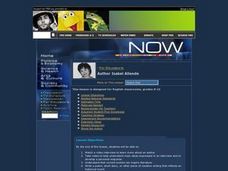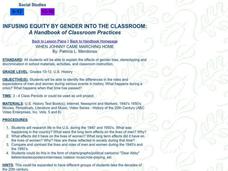Curated OER
Labor Rights
Students examine international labor laws. In this labor rights lesson, students analyze labor laws around the world. Students also read 2 case studies and determine how they do or do not fall into line with International Labor...
Curated OER
I Dig Your Art, Man (or Woman)
Twelfth graders write a thesis regarding a modern artist of their choice for a 15-20 multi-media presentation. In this lesson plan students create a Power Point, video, or some other visual representation studying an artist or modern...
Curated OER
Political Parties, Platforms, and Planks
Ninth graders examine the origins and functions of political parties. In this American Government lesson, 9th graders create a party platform to address political issues that are likely to arise during a national election. Students...
Curated OER
Your Land is My Land: A Look at Bootleg Coal Mining During the Depression
Students examine the extreme conditions of unemployment during the Great Depression. In this multiple perspectives lesson, students analyze photographs of coal mining, research and adopt the perspective of a person affected by...
Curated OER
Building a Peace
Students take a closer look at the rebuilding of Rwanda. In this current events instructional activity, students review the genocide in the country during the 1990's and perform role plays that require them to determine how to rebuild a...
Curated OER
You Be the Judge
Students explore nonfiction writing by completing a worksheet in class. In this research questions lesson, students read several stories about the Wild West icons Wyatt Earp and Wild Bill Hickok. Students answer study questions about the...
Curated OER
Literature: Isabel Allende
Students watch and respond to a Bill Moyers Now video on the Chilean author, Isabel Allende. They brainstorm a list of recent events that might inspire writers and choose one to write about in poetic, diary, or short story form.
Curated OER
The Building Blocks of the Nation
Students research, document, use the Internet, and employ varied computer skills, along with oral communication skills to discover people who have "made history" in Michigan, women in the United States, people who contributed to our...
Curated OER
The Life of Dona Felisa Rincon De Gautier
Young scholars identify Puerto Rico and discuss its relationship and proximity to the United States. Next, students identify significant events that occurred during Dona Felisa's term in office and how if may have affected her...
Curated OER
WHEN JOHNNY CAME MARCHING HOME
Students examine the roles of men and women throughout history.
Curated OER
Tolerance: Gender Issues
High schoolers explore why some professions have been gender-dominant in the past. In this lesson, students identify some professions that have typically had one specific gender employed in the past, then research that job to see when it...
Curated OER
The Real World War II
Young scholars work in groups in order to investigate primary and secondary resources in order to make their own conclusions about the history of World War II. They look at the evidence critically looking to find valid resources.
Curated OER
Splitting the Atom
High schoolers use the Internet to research the history of the splitting of the atom. They use that research to prepare a presentation on an aspect of that topic. A map is generated to record findings and results.
Curated OER
The Empires of Early Africa
Students view the video "Empires of Early Africa." They are asked: Who was Nefertiti? They review the facts about Akhenaten and Nefertiti. Students discuss how archaeologists looked for clues to determine the identity of the mummy...
Curated OER
Looking at the Old South: Music and Culture
Learners use different styles of music to research society, history and culture in the American South. They, in groups, research an assigned piece of music and make a presentation to the class. They keep a daily journal as well.
Curated OER
Memo from the Governor
Fourth graders inquire about the history of Florida's capital after receiving a mock memo from the governor.
Curated OER
A Woman's Crusade: Dorothea Dix
Students examine the life and reform efforts of Dorothea Dix on behalf of people with disabilities. They also examine the role of women in the 1840s and 1850s. They discover different sources of examples of citizen's rights.
Curated OER
Puppet Show
Students explore politics by defining several jobs in the government. In this House of Representatives lesson, students identify several important roles men and women have in the House as well as the Senate. Students identify what it is...
Curated OER
The Cost of Progress
Students examine the cost of progress from the 1500's to the 1800's around the world and create informative websites based upon their research. This instructional activity is intended for a high school World History class and uses the...
Curated OER
Fighting for Whose Freedom? Black Soldiers in the American Revolution
Students analyze primary sources about black soldiers in the American Revolution. They apply independent conclusions to create a piece of historical fiction. Students come to understand that as soldiers, scouts, or spies,...
Curated OER
The Reformation in England
In this world history worksheet set, students read two pages of information about the Reformation in England and Martin Luther. They read about the stages of the break from Rome. There are no questions associated with the page.
Curated OER
Constitutional Change During the Progressive Era
Young scholars analyze the passage of the 16th through 19th amendments during the Progressive Era around the turn of the century. Using research skills, they write papers and create portfolios supporting and opposing the adoption of...
Curated OER
Reform Movements
Students research the reform movements in connection to the suffering of women, African American rights, temperance and prohibition, education reform, etc... They brainstorm in groups in order to come up a historical analysis of the...
Curated OER
Pictures Telling Stories
Students see the importance of primary sources in the study of history, but also the limitations of relying only on primary sources of taking the money, as it were, at face value.

























